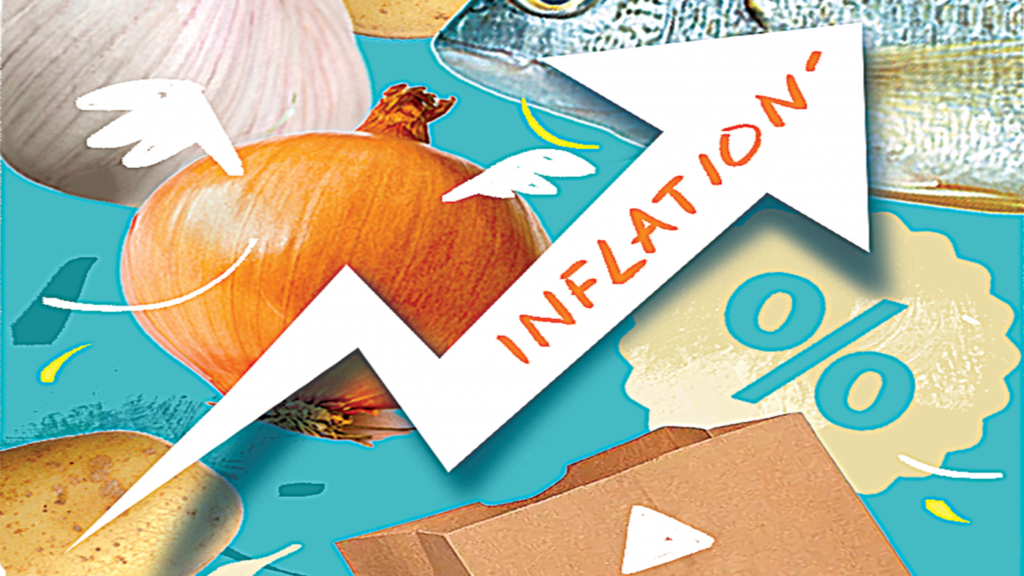Bangladesh has been running near double digit inflation for well over the past 12 months. This spells trouble for a government at any time, but this is especially worrisome in an election year. It is, therefore, hardly surprising that the Prime Minister has asked her economic team to fight and lower inflation quickly by all means. This is a good policy directive, and we wish the government success in securing this as rapidly as possible.
Setting a good policy target is the first step. Securing sustainable progress towards achieving the target is the real challenge. A part of the economic team is scrambling to arrest the upward trend of prices, particularly sensitive food prices, through price controls. This is based on the belief that market forces of demand and supply do not work owing to the functioning of syndicates managed by unscrupulous business houses who are creating artificial shortages in the market through hoarding and other manipulative behaviour with a view to earning monopoly-type profits.
It is certainly possible to improve the market supply chain through interventions in removing/easing supply chain barriers. These include policies to lower transport costs, investment in storage facilities, collection and dissemination of market information, increasing the availability of low-cost working capital, etc. Yet, a strategy to manage inflation through price controls in a market economy is fraught with risks and in the end is an exercise in futility. Individual goods and services prices and the pace of overall inflation are both a function of demand and supply. Government policy intervention must seek to work through factors that influence these two core elements of a market economy.
This assertion can be easily understood once we seek to analyse the fundamental factors that underlie the present inflationary episode. Bangladesh did enjoy an extended period of low inflation since the last episode of inflationary spike in FY2011-2012. The fundamental contributor to inflation then was excess growth in domestic credit and money supply. The subsequent correction of that phenomenon stabilised inflation starting in FY2013, and the average inflation rate stabilised at around 6% per year.
Inflationary pressures picked up again starting in April 2022 and the inflation rate has remained stubbornly high since then, presently hovering at close to 10% on an annualised basis. The immediate cause for this spike was the surge in global commodity prices, especially energy prices, owing to Covid-19 related supply chain disruptions. The global inflationary pressures accentuated with the onset of the Ukraine War in February 2022. But inflation has been sustained in Bangladesh by domestic policies that have fuelled demand, reflected in interest rate control to boost domestic credit and the use of money creation to finance budget deficits.
The contribution of inappropriate domestic policies to Bangladesh inflationary pressures is reflected in the fact that since early 2023 inflationary pressures have receded in USA, EU, and major Asian countries owing to decline in international energy and other commodity prices, and strong domestic demand management policies reflected in rising interest rates. Research shows that countries that curtailed domestic demand through interest rate hikes and the associated slowdown in the growth of domestic credit sharply lowered inflation rates. These rates have now stabilised at around the normal levels despite the ongoing Ukraine War.
Bangladesh has adamantly refused so far to adopt domestic demand management policies citing the fear of slowdown in private investment and GDP growth. In the event, GDP growth and private investment have fallen owing to import controls, shortage of energy and shortage of foreign exchange. So, the refusal to take demand management actions has not protected GDP growth or the investment rate but it has fuelled inflation.
In an environment of excess demand pressure that is hurting both the balance of payments and inflation, price controls will be totally ineffective. To reduce inflation, the government must go back to economic fundamentals, reduce excess demand by increasing domestic interest rates, cut fiscal deficits by raising tax revenues, and avoid the financing of budget deficits through money creation. On the supply side, the government can take steps to augment domestic availability of critical food and fuel imports, free up the exchange rate to boost export growth and remittances, eliminate import controls to support the domestic manufacturing sector, improve the functioning of domestic supply chain, and reduce import tariffs and para tariffs to lower the cost of imports.
The fear that freeing up the exchange rate will increase the cost of imports and fuel inflation can be partly addressed by lowering the present high rates of tariffs and para-tariffs. But the primary instrument of inflation control would have to be the reduction in domestic demand.
Importantly, the government must understand that in a market economy only price signals work. Prices in turn depend on demand and supply. Government policies aimed at regulating the behaviour of prices must be geared to influence the behaviour of demand and supply factors. Price controls do not work in a market economy and will simply create informal markets and lower the efficiency and productivity of the economy. If there are barriers to the effective functioning of the market, those barriers must be properly identified and resolved through appropriate policies. Price controls are an exercise in futility.
Sadiq Ahmed is Vice Chairman of the Policy Research Institute of Bangladesh
https://www.tbsnews.net/analysis/managing-inflation-through-price-controls-exercise-futility-705422







